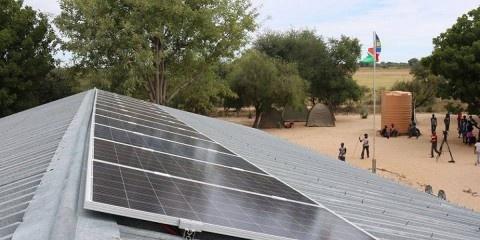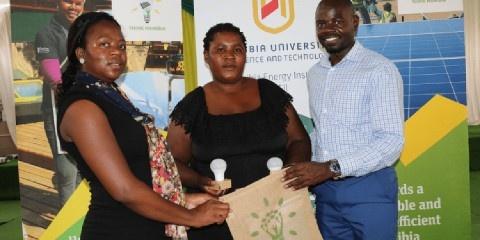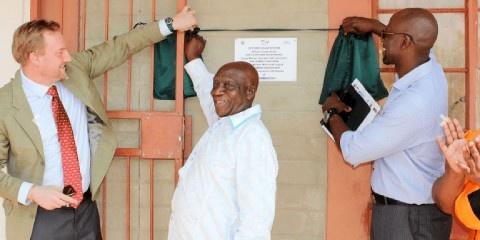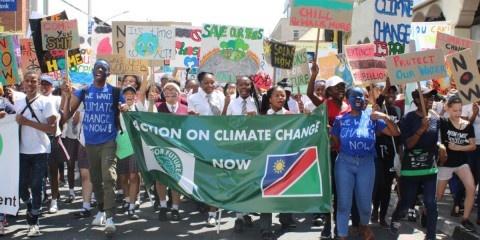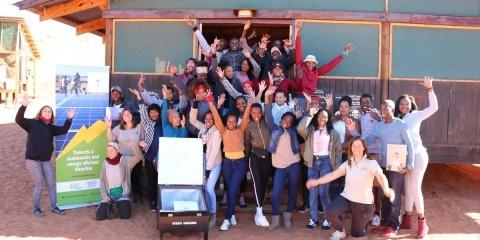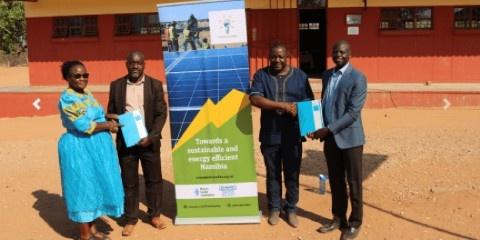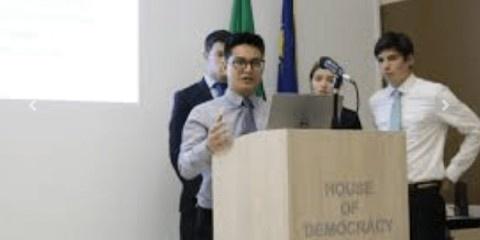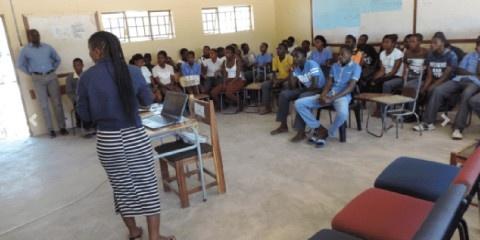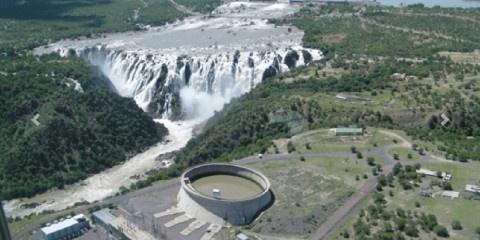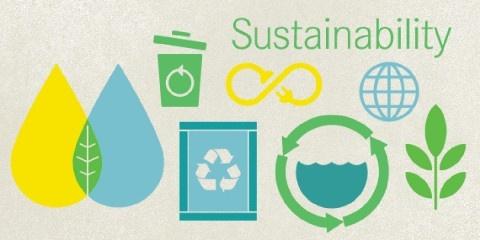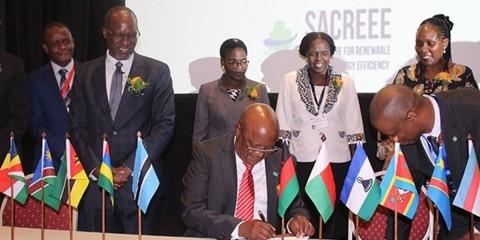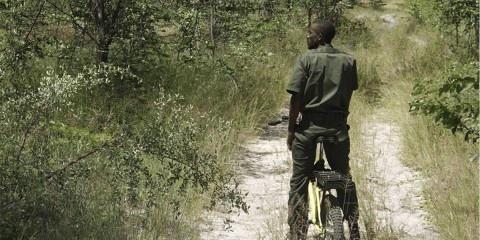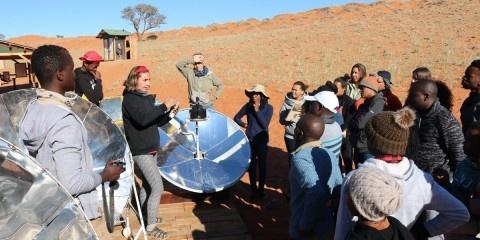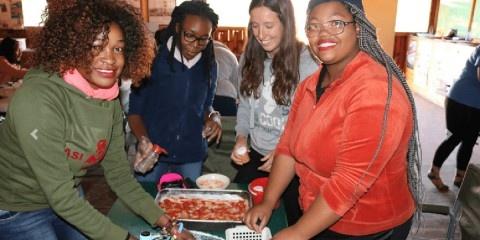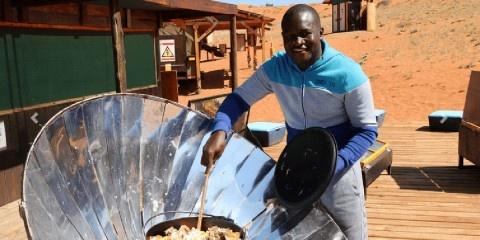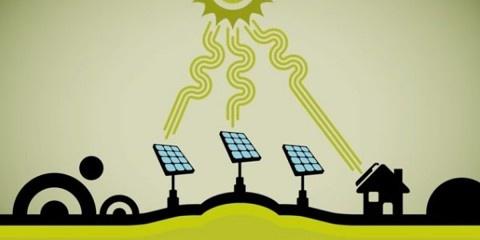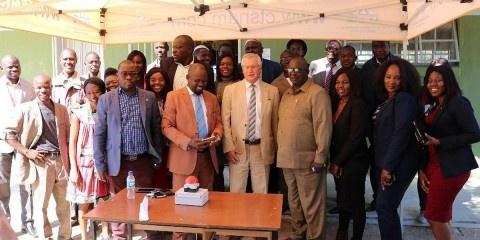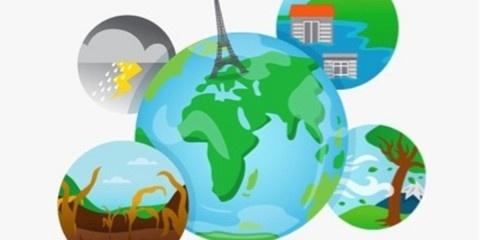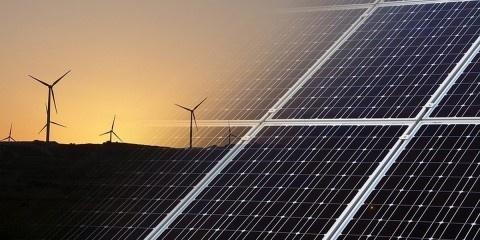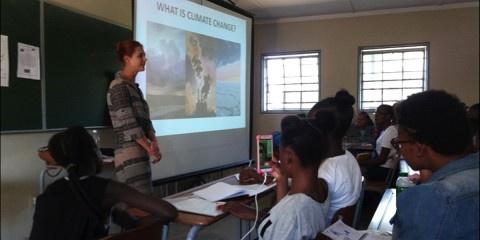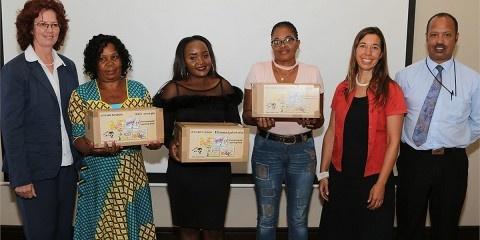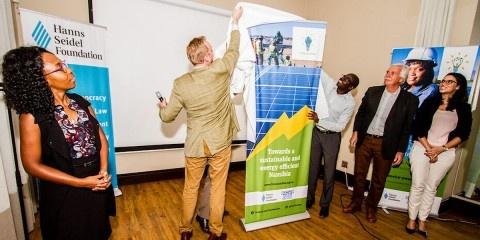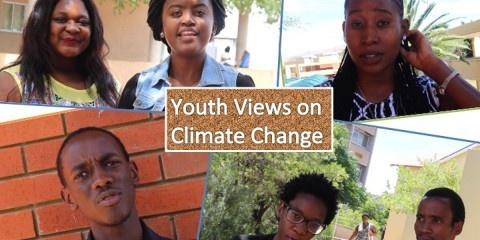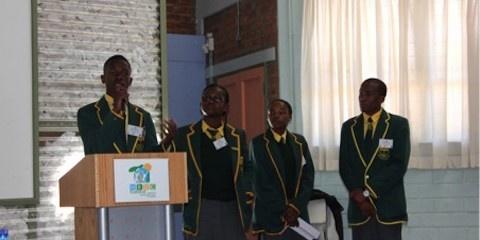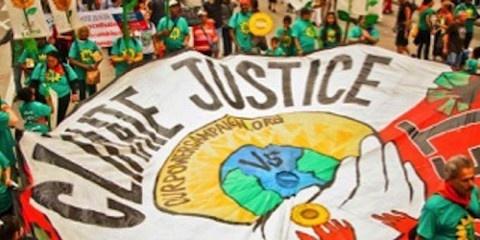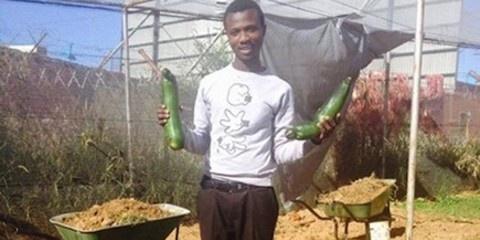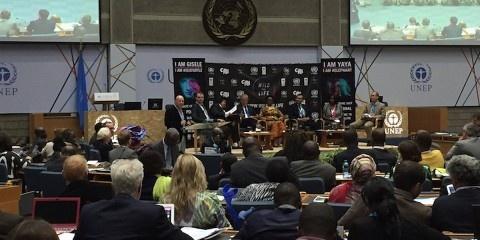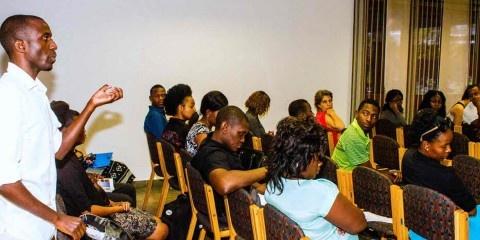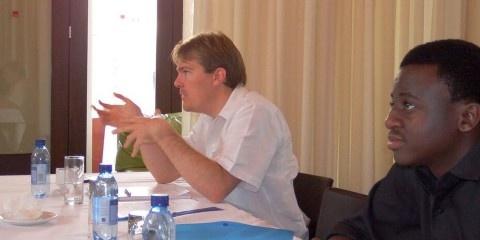With the COVID-19 crisis impact still present and weighing on us all, the current situation also provides an opportunity to look beyond our daily lives and to expand your knowledge. Given the myriad environmental challenges facing nations, it is important to have concrete resources from which and with which to manage existing environmental challenges. A common challenge, especially in Namibia, is a...
Access to electricity is critical to health care delivery and to the overarching goal of universal health coverage. However, the availability of electricity to support proper health services is less than adequate in many countries. According to the World Health Organization (WHO) studying over 4000 clinics and hospitals, about one in four health facilities has had an unreliable electricity supply. Clinics, maternity wards,...
A group of fourteen small business owners from different constituencies of the Zambezi Region recently received training from the Hanns Seidel Foundation in partnership with the Namibia University of Science and Technology, Namibia Energy Institute and the Zambezi Regional Council. The three days workshop aimed at helping small business owners develop business skills and identify business opportunities, help them identify renewable...
The Hanns Seidel Foundation (HSF) through its Promoting Renewable Energies in Namibia (PREN) project together with its partners Namibia Energy institute (NEI), Ministry of Mines and Energy (MME), Ministry of Environment and Tourism (MET) and the Zambezi Regional Council recently held a public dialogue focused on renewable energy and energy efficiency. The dialogue event, themed ‘Towards Making Global Goals and Agreements...
CHETTO – The Nsundwa Combined School in Zambezi Region this week became the proud recipient of a 3kW solar power system, which is much to the relief of teachers and learners. Situated in a flood-prone area, learners at the school had to rely on candles when studying at night.Nsundwa and Kandunda Kaseta Combined School in the Kongola Constituency benefited from the...
Ruan Bestbier: The Bank of Namibia’s report on Namibia’s second quarter performance found that fuel imports significantly contributed to the decline in the country’s current account. An analysis by PSG Namibia states that the value of fuel imports increased in part due to a rise in fuel consumption stemmed from higher electricity production at the Anixas diesel-run power plant. This emergency diesel...
You can call it a historic month in the history of climate action and you would not be far from right. On 20 September 2019 young people from all over the world took to the streets of their cities calling on governments to address climate change as an urgent issue, demanding for action on climate change. Along the Independence Avenue, young...
As Namibia continues to harness the abundant renewable energy resources, the country’s national power utility NamPower has considered an investment of N$1.9 Billion into a 40 Megawatts biomass project. The Otjikoto Biomass Power Station forms part of the generation projects of NamPower targeted to generate a total of 100 Megawatts. According to Grant Muller, head of generation projects at NamPower the...
By Selma Shiwaya A group of twenty-nine young people from seven regions across the country took part in a Solar Cooking and Sustainable Living workshop that recently took place at the Namib Desert Environmental Education Trust (NaDEET) Centre in the NamibRand Nature Reserve. Participants from Erongo, Karas, Hardap, Omaheke, Oshana, Omusati, Khomas and Kunene were part of the workshop that was...
WINDHOEK – With recent climatic disaster experienced in the Southern African region, Namibia says it is high time to call for the full implementation of the Paris Climate Agreement, and for all state parties to honour their commitments particularly to small states that are at the receiving end of climate calamities. This call was made by international relations Executive Director Selma...
The Hanns Seidel Foundation (HSF) recently electrified Otjikojo and Ongongo primary schools in Kunene region. The initiative, which forms part of the Foundation’s 3-year Pilot Project, Promoting Renewable Energies in Namibia (PREN), aims to electrify off-grid rural schools with renewable energy. At a cost of N$ 500 000 the initiative included the installation of 3-kilowatt solar power systems at the two...
Four students from the Worcester Polytechnic Institute in the United States of America developed a data portal of schools, hospitals, and clinics, with or without electricity in rural areas in Namibia. Known as Data Portal on Rural Electrification the system can trace such facilities with accuracy that includes distance to nearest power lines, images, and the ratio of students to teachers.
The PREN Project team accompanied by our project partners EduVentures and Namibia Energy Institute (NEI) embarked upon a familiarization visit to Kavango East and Zambezi Regions from 17 to 22 February 2019. The purpose of the visit was to meet local leaders to introduce the PREN Project and partners and visit rural schools that were identified to benefit from PREN Project...
Have you ever wondered what would happen to the earth if we continue on this roller coaster called unsustainable living? The environment has a remarkable ability to sustain itself. However, human behaviours disrupt the natural environment and threaten environmental sustainability. Current trends and patterns of resource-use, coupled with a rapidly changing, increasingly unequal balance of climate change, are impacting human-environment interactions...
Read more here: https://www.namibian.com.na/72575/read/New-regional-centre-set-to-drive-renewable-energy-efforts
There is a great African proverb that we live by at Nature is Home Namibia, it states, “There is no division between nature and humanity”. Nature is Home Namibia is a project that aims to produce eco-products and promote a nature loving society. We currently make and sell reusable shopping bags. It is important to live sustainably and in harmony with...
Recent efforts to increase the use of renewable energy sources have been driven by the following interrelated needs: to improve energy security and diversify energy sources, encourage sustainable economic development and protect the environment from the impacts of fossil fuel use. According to International Energy Agency (IEA), these motivations led to a step change in the development and deployment of a...
Solar Cooking and Sustainable Living Workshop. “During the week, one of the most important lessons was that a lot of things can be reused, instead of throwing them away. With an old drum, big nails, wire and pliers, one can build a fuel-efficient stove, that can replace cooking on open fires. With a bucket, a tap, a shower rose and some...
The Hanns Seidel Foundation (HSF) through its Promoting Renewable Energies in Namibia (PREN) project in partnership with the Namib Desert Environmental Education Trust (NaDEET) and National Youth Council of Namibia (NYC) recently held a solar cooking and sustainable living workshop. The workshop took place at the NaDEET Centre in the NamibRand Nature Reserve in the Namib Desert. Read more here: https://zone.my.na/news/youth-embrace-sustainable-energy-2018-09-11/
The objective of the workshop was to transfer practical knowledge of solar cooking and sustainable living through experimental methods. Read more here: https://www.namibian.com.na/71047/read/Solar-cooking-impresses-workshop-participants
There has been a recent rise in energy costs and according to the Electricity Control Board a tariff increase of 5%, translating to an effective bulk tariff increase from N$1,61 per kilowatt-hour to N$1,69 per kilowatt-hour for the financial year 2018/19. On that same note, petrol and diesel prices has increased to an effective 60 cents per litre in June. The new pump...
Ohangwena Region, 19 June 2018: While there are still 71 schools unelectrified in the Ohangwena region, pupils and teachers of the Omuuni and the Ondjabayonghalu Combined Schools have good reason to smile after having been equipped with a 3kW Solar PV Systems. Through the Promoting Renewable Energy in Namibia (PREN) Project of the Hanns Seidel Foundation (HSF) Namibia two systems were...
Climate change is a global challenge that does not respect national borders. It is an issue that requires solutions that need to be coordinated at the international level and it requires international cooperation to help developing countries move toward a low-carbon economy. To address climate change, countries adopted the Paris agreement at the COP21 in Paris on 12 December 2015 and...
Over the next 30 years Namibia’s population is set to almost double, and like the rest of the world, more and more people will be living in urban areas or cities (worldpopulationreview.com). This means that more people will be using electricity and the demand for energy will increase dramatically. In 2017, an incredible 50% of the population did not have access...
The Promoting Renewable Energies in Namibia (PREN) Project participated in a two-day workshop hosted by the Namibian Women Association’s (NAWA) Children’s Movement on the 28th & 29th April 2018 at Jakob Marengo Secondary School in Windhoek. Under the theme ‘We shall change the world’, the workshop was attended by learners from local schools in Windhoek as well as from other parts of the...
Environmental Sustainability Champion Of The Month (August) We profile an individual or organisation every month making great strides for environmental protection, climate change adaptation and mitigation or sustainable development in Namibia. Environmental Sustainability Champion For August 2017: Ester Hango Ester Hango is an Environmental Educator at the Ministry of Sport, Youth and National Services. She has a passion for the environment and is committed...
It is in early childhood that children often experience the greatest environmental challenges, and this is time the foundations of many of their fundamental attitudes and values are first put into place. Also, through research and experience, we know that even very young children are capable of sophisticated thinking in relation to socioenvironmental issues. Therefore, the earlier Education for Sustainable Development...
Sustainable development is everyone’s business. And as Namibia tackles a variety of environmental, social and economic challenges; it also has many opportunities to transform its economy into one powered by sustainable energy, efficient resource use, decent jobs and quality education. Public awareness, information sharing and capacity development are vital in order to continually make these opportunities for sustainable development a reality in Namibia. The first phase...
The Hanns Seidel Foundation (HSF) Namibia in collaboration with the Desert Research Foundation of Namibia (DRFN), main partners and broader stakeholders officially launched the Promoting Renewable Energies in Namibia project, on the 28th of September 2017 at NICE Restaurant in Windhoek. The event was aimed at introducing the PREN Project and outlining its objectives to various stakeholders. Moderated by Abraham Hangula from the Namibia Energy Institute...
Carbon dioxide (CO2) is one of the many greenhouse gases that in increased amounts contribute to global warming and climate change that we are currently faced with in Namibia and the world at large. Soils and plants store a lot of carbon, nearly twice the amount found in the atmosphere. This stored carbon in the soil acts as the basis of...
How Namibian Millennials Are Combating The Causes And Effects Of Climate Change Lifehack #1: Be Namibia’s Leo DiCaprio (on a budget) In my first blog post, I introduced you to the topic of climate change according to a Namibian millennial, whereupon I shared my views on climate change and shone the spotlight on climate justice. In this post I will be...
In the beginning, when the greatest of all scientists breathed life in all ecosystems and biodiversity, everything was in unison with each other, from the flying birds, to the flowing rivers and flora and fauna. Everything was normal, so much so that ecosystems were interlinked without any disturbance. The weather patterns were normal, the harvests were exceptional and the temperatures were...
Climate Change According To A Namibian Millennial Millennial; also known as Generation Y refers to those born between roughly the years 1980 and 2000. We the children born during and after the independent struggle, are the Namibian millennial. Critics call us the narcissistic, self-entitled generation; the trophy kids, who skip through life on the basis of participation is enough. I tend...
I grew up around rivers and enjoyed the rain every year. I never thought that one day I would see some of these rivers dry up. When I was younger I asked myself, what could have happened for the rivers to dry up? I thought the rains would always come and so everything would always flourish in accordance to the same...
Read this snapshot of the activities of the ThinkNamibia team over January and February 2016. The Green Lightbulb, Issue 1 BY LESLEY-ANNE VAN WYK, THINKNAMIBIA ENVIRONMENTAL AWARENESS
On the 23rd of May 2016, world environment leaders and experts convened in a cloudy Nairobi at the United Nations Environment Programme (UNEP) headquarters to open the second session of the highest-level decision-making body on the environment, namely; the United Nations Environment Assembly (UNEA-2). The theme for the UNEA-2 is ‘Delivering on the environmental dimension of the 2030 Agenda for sustainable development’. The UNEA...
Namibia ratified the United Nations Framework Convention on Climate Change (UNFCCC) in 1995. As a Non-annex 1 party to the Convention, Namibia is not obliged to reduce its Greenhouse Gas (GHG) emissions. However the country’s dependence on energy from South Africa and its favorable conditions for renewable energy, makes the transition to a low carbon economy an important long-term strategy. Climate...
In this article I intend to communicate why gender matters in climate change vulnerability assessments. I would like also to demonstrate with findings from my research work on gender and climate change in Namibia why it is vital to recognise gender differentiated vulnerabilities to impacts of climate change for effective and equitable adaptation. Existing literature and on-going research indicates that climate...
Namibia has an excellent legislative and policy backdrop for environmental protection and sustainable resource management. However, its economy is highly dependent on natural resources including diverse rangelands, arable land, mineral deposits, ecosystems and biodiversity. Economic and social development will be negatively affected with the challenges posed by climate change; especially with regard to water availability, food and livelihood security. There has...
Addressing climate change calls for multiple approaches. Nowadays there are so many messages that tell us what we should or should not do that it is often di cult to know what is right and what is wrong. The Namib Desert Environmental Education Trust (NaDEET) tackles climate change education through a “we practice what we teach” approach. Within this context, the...
I farm in the great Kunene region and this year of all years we feel the impacts of climate change the most. The farming business has become very fragile as we depend on Mother Nature for watering our crops and the veld in which our livestock graze. As such, the highly unpredictable rainfall in Namibia negatively impacts our farming activities. It...
Climate change projections for Namibia project temperature increases of 1 to 4°C and increased variability in rainfall patterns. The climate risks associated with temperature increase and unpredictable rainfall will impact subsistence farmers and consequently the rural Namibian population that rely mainly on rain-fed agriculture. The Adaptation at Scale in Semi-Arid Areas (ASSAR) is conducting research to deepen understanding of the drivers...
The EU is committed to become a highly energy-efficient, low-carbon economy, and is therefore at the forefront of international efforts to tackle Climate Change. Building a European Energy Union with a forward-looking climate policy is a top priority for the European Commission. As such, the EU has chosen the headship mode of leading by example, being the first region to have...
Paulus Hamutenya takes a close look at the tomato plant in his field. With his hands he feels the texture of the stems and leaves on the plant – nodding with distinct approval at the combination of quality, colour and thickness. “The organic fertilizer we have tried out for the last 2 months is definitely working”, he remarks with inevitable pride....
Climate Change Adaptation is a buzzing topic on the international agenda. But is it clear what adaptation to climate change in relation to ecosystems and their services means? Choosing the right approach and designing effective ecosystem-based adaptation measures is of utmost importance in order to successfully shield from the impacts of climate change. The Ministry of Environment and Tourism (MET), in...
Water in Namibia is free, but it also has a cost. This cost is the cost to supply water from its source to the tap of the user and does not include any cost for the water itself. The cost to supply water under the prevailing arid conditions in Namibia is very high and the therefore water is expensive. The trick...
On the 1st of October, 2015, the Water Youth Namibia, Hanns Seidel Foundation (HSF) Namibia and Desert Research Foundation of Namibia (DRFN) co-hosted a public dialogue focused on the role of youth in addressing Namibia’s water scarcity challenges. Water’s central role in the biosphere has long implied that several of the most important challenges confronting human development are related to fresh...
From the 27-28 August 2015, a Climate Change Media Training for Namibian Journalist was held in Windhoek. The training was initiated by the Media for Environment, Agriculture and Sustainable Development in Namibia (Mead-Namibia) and was funded by the Hanns Seidel Foundation (HSF) Namibia, through its Environmental Awareness and Climate Change Project. It was held at the Namibian Institute of Culinary Education (NICE)...
The United Nations Development Programme (UNDP) in Namibia has been supporting the Government and People of Namibia with the implementation of development programmes and projects since 1990. Such programmes and projects generally aim to improve the protection and conservation of natural resources, particularly renewable ones that people depend on for daily survival, i.e. use for food and to secure incomes and...
The extent to which any Government facilitates the requirements for equitable access to water and sanitation by its citizens has been under discussion for a long time by the international community. On 28 July 2010, after years of campaigning to capture the right to water and sanitation services, the United Nations General Assembly eventually passed Resolution 64/292 in which the right...
The other main reason to start this project is to educate and motivate people to conserve and sustain our environment through urban gardening. Being a part of the Tsumeb Young Achievers group has extremely uplifted and motivated me to pursue my interest in climate change. I want to encourage young people out there to contemplate sometime in their lives about starting...
It would be wrong and foolish to assume that the world’s leaders are incapable of the wisdom and foresight needed to come to an agreement this December in Paris on setting global limits to Greenhouse Gas Emissions (GGE). It would be equally wrong to believe that these politicians are incapable of the guile to agree on nothing more than what they...
Wolwedans – a household name in the Namibian tourism circuit – is more than a collection of camps. Its ethos lies in setting an example in sustainable business practices. During 2015 the entire Wolwedans Collection was audited by Eco-Awards Namibia and scored a five-flower rating at the very first go. This remarkable achievement affirms the leading role Wolwedans has adopted in running...

